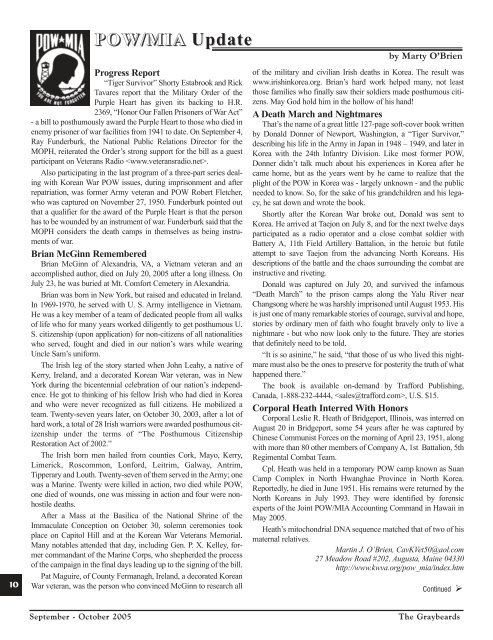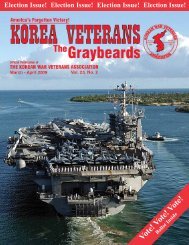Sep/Oct 2005 - Korean War Veterans Association
Sep/Oct 2005 - Korean War Veterans Association
Sep/Oct 2005 - Korean War Veterans Association
Create successful ePaper yourself
Turn your PDF publications into a flip-book with our unique Google optimized e-Paper software.
10<br />
POW/MIA Update<br />
Progress Report<br />
“Tiger Survivor” Shorty Estabrook and Rick<br />
Tavares report that the Military Order of the<br />
Purple Heart has given its backing to H.R.<br />
2369, “Honor Our Fallen Prisoners of <strong>War</strong> Act”<br />
- a bill to posthumously award the Purple Heart to those who died in<br />
enemy prisoner of war facilities from 1941 to date. On <strong>Sep</strong>tember 4,<br />
Ray Funderburk, the National Public Relations Director for the<br />
MOPH, reiterated the Order’s strong support for the bill as a guest<br />
participant on <strong>Veterans</strong> Radio .<br />
Also participating in the last program of a three-part series dealing<br />
with <strong>Korean</strong> <strong>War</strong> POW issues, during imprisonment and after<br />
repatriation, was former Army veteran and POW Robert Fletcher,<br />
who was captured on November 27, 1950. Funderburk pointed out<br />
that a qualifier for the award of the Purple Heart is that the person<br />
has to be wounded by an instrument of war. Funderburk said that the<br />
MOPH considers the death camps in themselves as being instruments<br />
of war.<br />
Brian McGinn Remembered<br />
Brian McGinn of Alexandria, VA, a Vietnam veteran and an<br />
accomplished author, died on July 20, <strong>2005</strong> after a long illness. On<br />
July 23, he was buried at Mt. Comfort Cemetery in Alexandria.<br />
Brian was born in New York, but raised and educated in Ireland.<br />
In 1969-1970, he served with U. S. Army intelligence in Vietnam.<br />
He was a key member of a team of dedicated people from all walks<br />
of life who for many years worked diligently to get posthumous U.<br />
S. citizenship (upon application) for non-citizens of all nationalities<br />
who served, fought and died in our nation’s wars while wearing<br />
Uncle Sam’s uniform.<br />
The Irish leg of the story started when John Leahy, a native of<br />
Kerry, Ireland, and a decorated <strong>Korean</strong> <strong>War</strong> veteran, was in New<br />
York during the bicentennial celebration of our nation’s independence.<br />
He got to thinking of his fellow Irish who had died in Korea<br />
and who were never recognized as full citizens. He mobilized a<br />
team. Twenty-seven years later, on <strong>Oct</strong>ober 30, 2003, after a lot of<br />
hard work, a total of 28 Irish warriors were awarded posthumous citizenship<br />
under the terms of “The Posthumous Citizenship<br />
Restoration Act of 2002.”<br />
The Irish born men hailed from counties Cork, Mayo, Kerry,<br />
Limerick, Roscommon, Lonford, Leitrim, Galway, Antrim,<br />
Tipperary and Louth. Twenty-seven of them served in the Army; one<br />
was a Marine. Twenty were killed in action, two died while POW,<br />
one died of wounds, one was missing in action and four were nonhostile<br />
deaths.<br />
After a Mass at the Basilica of the National Shrine of the<br />
Immaculate Conception on <strong>Oct</strong>ober 30, solemn ceremonies took<br />
place on Capitol Hill and at the <strong>Korean</strong> <strong>War</strong> <strong>Veterans</strong> Memorial.<br />
Many notables attended that day, including Gen. P. X. Kelley, former<br />
commandant of the Marine Corps, who shepherded the process<br />
of the campaign in the final days leading up to the signing of the bill.<br />
Pat Maguire, of County Fermanagh, Ireland, a decorated <strong>Korean</strong><br />
<strong>War</strong> veteran, was the person who convinced McGinn to research all<br />
by Marty O’Brien<br />
of the military and civilian Irish deaths in Korea. The result was<br />
www.irishinkorea.org. Brian’s hard work helped many, not least<br />
those families who finally saw their soldiers made posthumous citizens.<br />
May God hold him in the hollow of his hand!<br />
A Death March and Nightmares<br />
That’s the name of a great little 127-page soft-cover book written<br />
by Donald Donner of Newport, Washington, a “Tiger Survivor,”<br />
describing his life in the Army in Japan in 1948 – 1949, and later in<br />
Korea with the 24th Infantry Division. Like most former POW,<br />
Donner didn’t talk much about his experiences in Korea after he<br />
came home, but as the years went by he came to realize that the<br />
plight of the POW in Korea was - largely unknown - and the public<br />
needed to know. So, for the sake of his grandchildren and his legacy,<br />
he sat down and wrote the book.<br />
Shortly after the <strong>Korean</strong> <strong>War</strong> broke out, Donald was sent to<br />
Korea. He arrived at Taejon on July 8, and for the next twelve days<br />
participated as a radio operator and a close combat soldier with<br />
Battery A, 11th Field Artillery Battalion, in the heroic but futile<br />
attempt to save Taejon from the advancing North <strong>Korean</strong>s. His<br />
descriptions of the battle and the chaos surrounding the combat are<br />
instructive and riveting.<br />
Donald was captured on July 20, and survived the infamous<br />
“Death March” to the prison camps along the Yalu River near<br />
Changsong where he was harshly imprisoned until August 1953. His<br />
is just one of many remarkable stories of courage, survival and hope,<br />
stories by ordinary men of faith who fought bravely only to live a<br />
nightmare - but who now look only to the future. They are stories<br />
that definitely need to be told.<br />
“It is so asinine,” he said, “that those of us who lived this nightmare<br />
must also be the ones to preserve for posterity the truth of what<br />
happened there.”<br />
The book is available on-demand by Trafford Publishing,<br />
Canada, 1-888-232-4444, , U.S. $15.<br />
Corporal Heath Interred With Honors<br />
Corporal Leslie R. Heath of Bridgeport, Illinois, was interred on<br />
August 20 in Bridgeport, some 54 years after he was captured by<br />
Chinese Communist Forces on the morning of April 23, 1951, along<br />
with more than 80 other members of Company A, 1st Battalion, 5th<br />
Regimental Combat Team.<br />
Cpl. Heath was held in a temporary POW camp known as Suan<br />
Camp Complex in North Hwanghae Province in North Korea.<br />
Reportedly, he died in June 1951. His remains were returned by the<br />
North <strong>Korean</strong>s in July 1993. They were identified by forensic<br />
experts of the Joint POW/MIA Accounting Command in Hawaii in<br />
May <strong>2005</strong>.<br />
Heath’s mitochondrial DNA sequence matched that of two of his<br />
maternal relatives.<br />
Martin J. O’Brien, CavKVet50@aol.com<br />
27 Meadow Road #202, Augusta, Maine 04330<br />
http://www.kwva.org/pow_mia/index.htm<br />
Continued <br />
<strong>Sep</strong>tember - <strong>Oct</strong>ober <strong>2005</strong><br />
The Graybeards
















